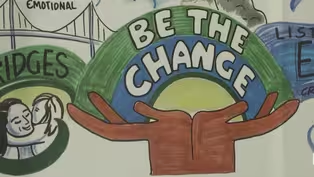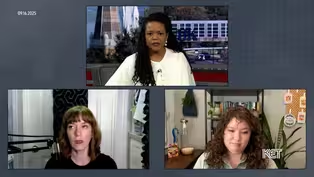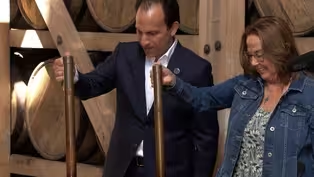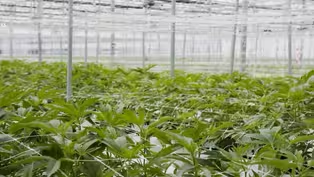
Insect Populations Decline Without Direct Human Interference
Clip: Season 4 Episode 58 | 3m 16sVideo has Closed Captions
New study shows insect populations declining even when people aren't around to bug them.
A new study out shows insect populations are declining even without direct inference from humans. We asked one of Kentucky’s leading entomologists about the study and why it has many in his field buzzing.
Problems playing video? | Closed Captioning Feedback
Problems playing video? | Closed Captioning Feedback
Kentucky Edition is a local public television program presented by KET

Insect Populations Decline Without Direct Human Interference
Clip: Season 4 Episode 58 | 3m 16sVideo has Closed Captions
A new study out shows insect populations are declining even without direct inference from humans. We asked one of Kentucky’s leading entomologists about the study and why it has many in his field buzzing.
Problems playing video? | Closed Captioning Feedback
How to Watch Kentucky Edition
Kentucky Edition is available to stream on pbs.org and the free PBS App, available on iPhone, Apple TV, Android TV, Android smartphones, Amazon Fire TV, Amazon Fire Tablet, Roku, Samsung Smart TV, and Vizio.
Providing Support for PBS.org
Learn Moreabout PBS online sponsorshipA new study out shows insect populations are declining even when people aren't around about them.
Researchers studied an insect population in a meadow in a remote area in the Colorado mountains for a 20 year period.
Over that time period, the population declined by more than 70% without direct interference from human beings.
We asked one of the state's leading entomologists about the study and why it has many in this field buzzing.
I don't think that we would cease to exist if insects were to disappear.
But I do think that you're talking about a radically different Earth at that point.
You're talking about a place that that would be almost unrecognizable.
We need insects because in a lot of the food webs, the ecosystems that are around us, insects are part of the foundation.
Plants really lay the whole foundation for everything that kind of exists within that food web.
But if you start to dig into it, one step up from those plants is usually a whole host of insects.
I would say broadly, when I've talked to experts, when I've interviewed them for podcasts and things about insect decline, they generally are saying things like, we've seen a decline of 60 to 70% of the insect biomass over the last 50 years or so.
For some specific groups, there are papers that seem to show greater impacts of greater loss, ranging from 70 up.
And this study, they were talking in terms of the 70 percentile range and some of these reductions.
So pretty steep three fourths almost of the life that they were being that was being studied specifically in this paper is being reduced at this small location.
This study was very specifically about this kind of low mountainous area in Colorado, but it also supports some of the evidence that is seen in other areas.
So this paper was very impactful because it has that 30 years worth of data to make comparisons with.
But if we don't have that, it's harder to make these kinds of statements.
One of the big I would say highlight items of this particular study is that this is a look at an area that's otherwise kind of undisturbed by human interference.
Some of the other work that's been published on this, it looks at agro ecosystems of fields of corn and soybeans and things like that, or places where urbanization is expanding.
But this seems to be a pristine habitat.
The insects should be doing fine.
And what what they show in this paper, at least, is that that doesn't seem to be the case.
And that means that there are some other effects that are seeping into this area.
So what could those be?
It could be a whole host of different things.
But the one that the publication seems to arrive at the strongest is that these are these effects that climate change might be inducing on the planet, may be driving some of these factors that are reducing these insect populations, changing the climate there to be less suitable to them.
This is a very specific type of ecosystem with very specific parameters.
Things that live there would have adapted to those specific parameters.
And any sort of change or perturbation in that is going to make it harder for them to be able to survive.
There.
The study can be found in this month's issue of the journal ecology.
Video has Closed Captions
Clip: S4 Ep58 | 3m 34s | Annual conference shares resources on preventing child abuse. (3m 34s)
"Pantsuit Politics" Podcasters Discuss Toxic Social Media
Video has Closed Captions
Clip: S4 Ep58 | 10m 58s | Podcasters talk about what can be done to improve social media's toxic atmosphere. (10m 58s)
Stivers Says Lawmakers Noting Bourbon Industry’s Challenges
Video has Closed Captions
Clip: S4 Ep58 | 2m 32s | Senate President says lawmakers will try to create best environment for bourbon industry. (2m 32s)
UK Could Open Indoor Cannabis-growing Facility
Video has Closed Captions
Clip: S4 Ep58 | 3m 40s | Director of UK Cannabis Center updates lawmakers on future plans for center. (3m 40s)
Providing Support for PBS.org
Learn Moreabout PBS online sponsorship
- News and Public Affairs

Top journalists deliver compelling original analysis of the hour's headlines.

- News and Public Affairs

FRONTLINE is investigative journalism that questions, explains and changes our world.












Support for PBS provided by:
Kentucky Edition is a local public television program presented by KET



